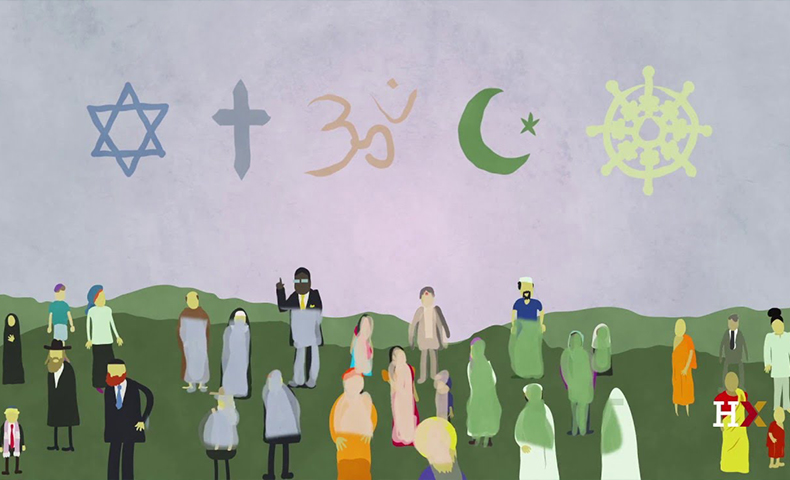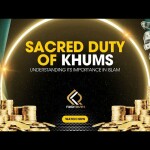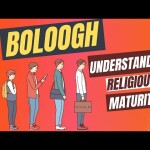Often we hear some patent slogan used against ’’Religion’’ they are nowadays widely used by the disbelievers.
They say:
(a) Religion is anti-science.
(b) Religion was a drug invented by capitalists to keep the oppressed classes content with their wretched condition. In other words it was opium to make people sleep.
(c) Religion retards material and intellectual progress.
Let us, now examine these allegations. All these statements have been made by the Europeans (from Karl Marx to Bertrand Russell) who had known a particular religion only i.e. Christianity. They committed the intellectual sin of seeing a particular religion and assuming all religions (Including Islam) must be of the same calibre. It was, to say the least, a fallacy, if not a deliberate deception.
To explain the above statement, it is necessary to pint out just in general outline what was the attitude of Christianity towards knowledge and progress.
‘’From the sixteenth century A.D. the conflict between the church and science began. This most unfortunate struggle was not started by the scientist but by the protagonists of Christianity, who feared that their religion was in dire danger of losing its hold on the masses. Their house of cards was threatening to fall down. Both Catholics and Protestants, though they were at logger-heads themselves, took the same stand against the impact of revolutionary scientific theories of Copernicus and Galileo. They did what every tyrant, afraid of his inherent weakness, does. Ruthless persecutions were launched against the brave scientists who defied the church and said what they knew was the truth.
‘’At first we should take Copernicus (Nicolaus Koppernik) 1473-1543, as he was the man who set the ball rolling. He did not dare to publish his work, “On the revolution of Heavenly Bodies’’, for a long time due to the fear of the church. In the end he successfully tried to appease the church by dedicating the book to the Pope. In fact his publisher wrote a preface alleging that the theory of the earth’s motion was only a hypothesis and not an assertion as positive truth. In the words of Lord Bertrand Russell, ‘For a time, these tactics sufficed, and it was only Galileo’s bolder defiance that brought retrospective condemnation upon Copernicus. (Religion and Science)
‘’Luther, also, opposed the Copernican system on the theological grounds.
‘’Galileo Galilei (1564-1642), though once a friend of Pope Urban VIII, was thrown into the prison of Inquisition by the orders of the same pope and threatened with torture if he did not recant. Galileo’s only crime was that he supported the Copernican system because of the observations made with his telescope. These observations were more difficult to cope with for the church than the theoretical of Copernicus.
“Giordano Bruno (1549-1600) was another victim of the cruelty of the ‘tolerant’ people. He was burnt alive.
‘’As Lord Bertrand Russell has written: “Theologians were not slow to point out that the new doctrine would make the Incarnation difficult to believe.” (Religion and Science)
“So the Inquisition announced the following as the truth: “The first proposition that the sun is the centre and does not revolve about the earth is foolish, absurd, false in theology and heretical; because expressly contrary to the Holy Scriptures. . .
The second proposition that the earth is not centre, but revolves about the sun is absurd, false in philosophy, and from a theological point of view at least opposed to the true faith.' (Religion and Science).
"And as it was not enough, the Jesuit Father Melchior Inhofe postulated that 'the opinion of the earth's motion is of all heresies the most abominable, the most pernicious, the most scandalous; the immovability of the earth is thrice sacred; arguments against the immortality of the soul, the existence of God, and the Incarnation should be tolerated sooner than an argument to prove that the earth moves.' (Religion and, Science).
Faced with this ruthless oppression, the scientists, in their turn, denounced Christianity as ''anti-intellectual, anti-science, a pack of superstitions and degrading to human progress." What is not understandable is that they aimed their broad-side to all the religions; certainly Islam can never be termed 'un-scientific, illogical or anti-progress.
In fact Islam is based on logic and science and promotes the progress by calling human beings to gain knowledge, do research, , and think all possibilities before making decisions or taking actions. and of course follow just the truth.
Evolution versus Religion
It is said that the 'Evolution' has proved that there was no need of a Supreme Being in the scheme of the universe.
Though the best place to deal with this question would have been in the Unit 2 (God of Islam); but I propose to give here some points for the student to ponder.
First of all, let it be clear that here I am not talking about the truth or otherwise of the theory of Evolution. This is not the place for it.
Secondly, that mere change within the basic type of living things is not 'evolution.'
The theory of organic evolution involves these three main ideas:
- Living things change from generation to generation, producing descendants with new characteristics
- This process has been going on so long that it has produced all the groups and kinds of things now living; as well as others lived long ago and have died out, or become extinct.
- These different living things are related to each other.”
(World Book Encyclopedia, 1966)
Thirdly that in spite of all assertions to the contrary, Evolution is still a theory, not a fact.
Fact as Webster’s third New International Dictionary says is ‘’an actual happening in time or space’’, a ‘’verified statement.’’
Now what is the ‘’verification’’ of this theory?
A prominent evolutionist W. Le Gros Clark, writes in his book, The Fossil Evidence for Human Evolution:-
‘’The chances of finding the fossil remains of actual ancestors, or even representatives of local geographical group which provided the actual ancestors, are so fantastically remote as not to be worth consideration.
‘’The interpretation of the paleontological evidence of hominid evolution which has been offered in the preceding chapters is a provisional interpretation. Because of the incompleteness of the evidence, it could hardly be otherwise.’’
The science News Letter said in 1965: “The fight is among scientist over just how man did evolve, when he did so and what he looked like.
The above mentioned Mr. Clark writes: “What was the ultimate origin of man?. . . .
Unfortunately, any answers which can at present be given to these questions are based on indirect evidence and thus are largely conjectural.”
A former president of the American Association for the Advancement of science wrote in Science Magazine in support of evolution:-
‘’Come now if you will on a speculative excursion into prehistory. Assume the era in which the species sapiens emerged from the genus Homo . . . hasten across the millenniums for which present information depends for the most part on conjecture and interpretation to the era of the first inscribed records, from which some facts may be gleaned."
L.M. Davies, a British Scientist, once said: "It has been estimated that no fewer than 800 phrases in the subjunctive mood (such as 'Let us assume ' or 'We may well suppose' etc.) are to be found between the covers of Darwin's 'Origin of Species' alone."
When you ponder upon the statements quoted above and especially the phrase given in italics by us, you will come to this conclusion that Evolution is not an established fact, but only a theory, among many theories which have been advanced since the beginning of mankind to explain the nature of universe. Many of such theories are now discarded, but once they had the same hold on minds as the theory of Evolution has at present. And this hold on minds does not make it any more perfect.
Indeed, one scientist, Dr. T.N. Tahmisian, a physiologist for the Atomic Energy Commission, said: “Scientists who go about teaching that evolution is a fact of life are great con men, and the story they are telling may be the greatest hoax ever. In explaining evolution we do not have one iota of fact,” He called it "a tangled mishmash of guessing games and figure juggling' Another scientist, head of a college science department, J.W. Klotz, stated in 1965 that "acceptance of evolution is still based on a great deal of faith."
And this theory has yet to find enough evidence to support itself. How can such a 'theory' be used to refute the existence of a 'Supreme Being'?
Finally, even the evolutionists do acknowledge that there is the need of an "Ever living, All Knowing, Almighty Being," in the scheme of the Universe as explained by the theory of 'Evolution'.
But, once committed to the denial of God, they are attributing these virtues to that 'Nature' They say that 'Nature' adopted this "Nature" planned that.
Let us see what is this 'nature' anyway? It is nothing but an abstract idea formed in human brain after careful study of the behavior of things, If may be found within the things; but it has no independent existence, And in any case, there is no record of any conference of the 'natures' of various things, held to decide how to co-ordinate their functions. Flowers never conferred with the bees to seek the bees' co-operation in their pollination, offering them, in exchange, their nectar. But we know that bees could not live a single day without flowers; and thousands of flowers would long have been extinct but for the bees.
So, you see, the evolutionists recognize the need of a 'Planner', a 'Designer'. But dogmatically go on repeating that that designer and planner was the 'Nature' (which is just an abstract idea) or the 'Matter' which is a 'Senseless, lifeless thing'.
The so-called Pascal’s Bet
Imam Ali has said to a man who contested with him on the question of the other world: If the truth is what you pretend (i.e., there is no life hereafter), then we shall all be saved; but if the truth is what I have said (i.e., there: is a life hereafter) then you will be condemned and I shall be saved.
That is the very sound, practical, down to earth reasoning in favour of believing in a Creator and a Day of Judgment.
Remember that Ali did not propound this argument in order to cast a shadow of doubt on the reality of the life-hereafter; but it is merely an argument to convince those people who are incapable of knowing that by logical demonstration.
One thousand years after Ali bin Abi Talib (a.s) came the famous mathematician Pascal (died 1662 A.D) and his famous ‘’Parido Pascal’’ (Pascal’s Bet) by which he wished to prove the same thing to the same group of people. His argument can be briefly stated in this way:
"If you believe in the life-hereafter you will gain everything if it really exists; and you lose nothing if it does not exist. Therefore, it is better to bet that it does exist." (Pascal: Ben sees, edited by Y. Brunchircy, Paris 1912, p. 439).











